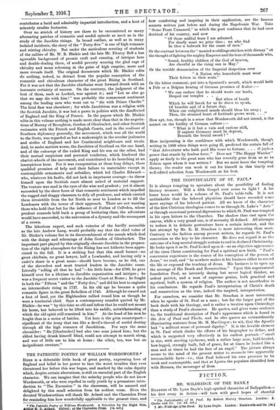THE PATRIOTIC POETRY OF WILLIAM WORDSWORTH.* HERE is a delectable
little book of great poetry, expressing love of England and belief in her power to face the worst troubles that ever threatened her before this war began, and marked by the calm dignity which, despite certain aberrations, is still an essential part of the English character. We can imagine that the unlucky people who do not know Wordsworth, or who were repelled in early youth by a premature intro- dnetion to " The Excursion " in the classroom, will be amazed and delighted by this small selection from his noblest verse. Even the devoted Wordsworthian will thank Mr. Acland and the Clarendon Press for reminding him how wonderfully applicable to the present time, and
• The Patriotic Poetry of William Wordsworth. A Selection by the Right Hon. Arthur H. D. Arland. Oxford ; at the Clarendon Press. [Is. net.]
how comforting and inspiring in their application, are the famous sonnets written just before and during the Napoleonic War. Take " Some Fears Unnamed," in which the poet confesses that he had once doubted of his country, and now " Of those =filial fears I am ashamed.
For dearly must we prize thee ; we who find In thee a bulwark for the cause of men."
Or the contrast between the " monied worldlings stricken with dismay " at the thought of fighting the mighty Emperor and the tens of thousands who, " Sound, healthy children of the God of heaven, Are cheerful as the rising sun in May."
Or the terrible denunciation of the Imperial despotism over " A Nation who henceforth must wear Their fetters in their souls."
Or the bitter comment, put into a Spaniard's mouth, which would befit a Pole or a Belgian hearing of German promises of Kultur :— " We can endure that ho should waste our lands,
Despoil our temples . . .
But when of bands Which he will break for us he dares to speak, Of benefits and of a future day, When our enlightened minds should bless his away ; Then, the strained heart of fortitude grows weak. . . . '
How apt, too, though in a sense that Wordsworth did not intend, is the sonnet on the futility of German culture :- "What is it but a vain and curious skill, If sapient Germany must lie deprost, Beneath the brutal sword ? "
How invigorating is the confidence with which Wordsworth, though writing in 1809 when things were going ill, predicted the certain fall of " that Adventurer who hath paid His vows to fortune. . . . 0 joyless power that stands by lawless force." Does not "The Happy Warrior" apply as finely to the great man who has recently gone from us as to Nelson upon whom it was written ? But we must leave the tempting theme; the reader can work it out for himself in this timely and well-edited selection from Wordsworth at his best.






























 Previous page
Previous page